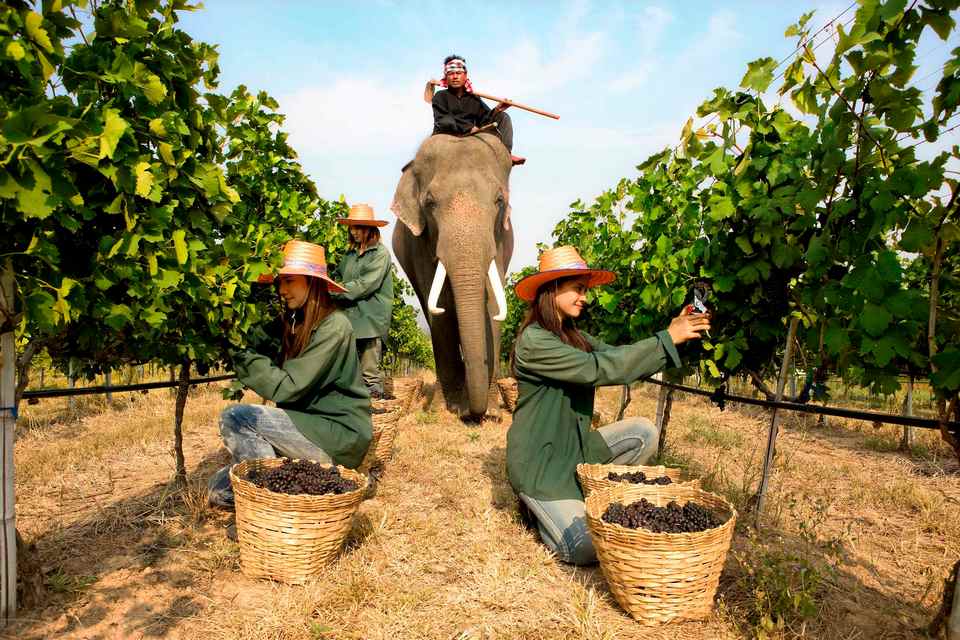
You could be forgiven for thinking that the only wine made in Thailand is Mont Clair, the work-horse plonk that shows up in every modest bar and restaurant in town. It’s been around for years ever since someone at Siam Winery hit on the novel idea of blending South African grape concentrate with local fruit juice. But you might be surprised to know that this country also produces “real” wine made using traditional methods from grapes grown in Thailand.
Having tasted many Thai wines in recent years I can assure you that some of them are superb and of international quality. You don’t need to take my word for it (though you should, of course) because many Thai wines have won prestigious international awards. But you won’t find any of them in your local 7-Eleven, that’s for sure. If you want to enjoy these vinous treats, you have to dig a little deeper.
There are currently nine wineries in Thailand. Three of them consistently produce top-class award-winning wines. Most of them are worth visiting and some even provide accommodation.
But you know, for many years it was assumed that wine grapes simply wouldn’t grow in Thailand. For one thing, the country was too close to the equator and some experts thought the soil was not suitable. They were proved wrong when a royal project began experimental grape planting forty years ago. It turned out that certain locations, especially those in hilly regions were ideal for growing wine grapes. Today most of Thailand’s vineyards lie at 900 to 1,200 feet above sea-level and the harvest is once a year between January and the middle of March.
Khao Yai National Park is the home to several hundred wild elephants and many other animals, including the barking deer, the Malayan sun bear and the gaur – a kind of odd-looking wild cow. Several Thai wineries lie close to Khao Yai although there are others in the North and Central regions. Incidentally, if you don’t speak Thai, khao yai means “big mountain”. Actually, it means “big mountain” whether you speak Thai or not.
PB Valley Khao Yai Winery has been producing wine since 1998. The “PB” refers to the initials of its founder Dr. Piya Bhirombhakdi. The winery lies on the edge of Khao Yai National Park in a 400-hectare (1,000 acre) plantation and it’s a 2-hour drive along the six-lane highway from Bangkok. You’ll find classics such as Chenin Blanc, Shiraz, Merlot, Tempranillo, Colombard and Cabernet Sauvignon as well as less well-known red varieties. The winery employs two fully accredited winemakers and uses state-of-the-art technology.
PB Valley wines have won many international awards from various organizations including The Austrian Wine Challenge, the Hong Kong International Wine and Spirit Competition and Decanter World Wine Awards. Some of their wine is available online, notably at Wine-Now Asia. Or take a trip to Kao Yai and buy them on site. You can also take a wine tour or enjoy a meal at the winery’s Great Hornbill Restaurant which serves Thai and Western food. And yes, pizza too, since you asked. (www.pbvalley.com/)
Not far away in Asoke Valley, you’ll find the smaller GranMonte Winery, with its beautiful vineyard. GranMonte (pronounced “Gran-MON-tay”) is the Italianized version of “big mountain” and their wines have won many awards at international wine competitions.
Wine-maker Nikki Lohitnavy studied at the University of Adelaide and has degrees in viticulture and wine-making. The estate covers 15 hectares (38 acres) and produces Syrah, Cabernet Sauvignon, Chenin Blanc and other varieties. You can buy the wines there too and guided tours are also available. You can also buy their splendid award-winning wines online (www.granmonte.com/). You will not be disappointed.
Monsoon Valley Wines was founded in 2001 by Chalerm Yoovidhya and its flagship vineyard lies about 20 miles from Hua Hin beach and covers over 110 Hectare (270 acres). The vineyard grows several well-known varietals and Monsoon Valley Wines have won many coveted international awards.
The company also offers wine tastings, a wine safari, mountain biking or visits to the elephant sanctuary. There’s also the delightful Sala Restaurant and Bistro housed in a traditional Thai pavilion. You can check their extensive range of wines online (www.monsoonvalley.com/en).
About 155 miles northeast of Bangkok is Village Farm & Winery, a small family-run business that occupies a 13-hectare (32 acres) domain. Besides its grapes and wines production, the estate has a restaurant, a hotel and a spa and offers a wide range of tourist activities. Their main wine label is Château des Brumes (“Chateau in the Mist”) and their reds tend to be rich, firm and full-bodied. The company will also deliver wines and can be visited online. (www.villagefarm.co.th)
If you’d prefer to visit somewhere nearer home, try Silverlake Vineyard which is located near to Buddha Mountain (Khao Cheejan). The winery produces Sauvignon Blanc, Shiraz, Cabernet Sauvignon and Chardonnay and offers several interesting tourist attractions.
The pleasant Silverlake restaurant serves a variety of Thai and Western dishes. (www.silverlakevineyard.com/) Incidentally, don’t assume that because Thai wine is made locally, it’ll be cheaper than imported products. It won’t be. Our punitive and crippling heavy taxes and duty have made certain of that.
 |
 |
 |





